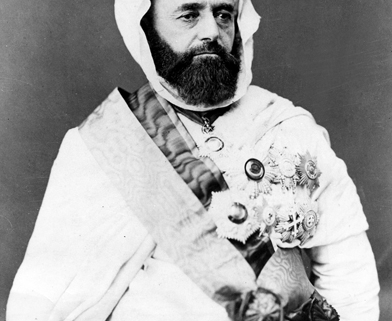Abdul Qadir Al Jaza’iri has a story quite similar to that of Omar Mukhtar. He was born in 1808 in Guenta, Algeria and grew up in his father, Muhieddin’s Islamic School. Abdul Qadir quickly excelled in his learning and by the age of 14, he memorised the Qur’an. His father Muhieddin Al Hasani was from the lineage of Hasan Ibn Ali which makes Abdul Qadir a descendant of the Prophet Muhammad (SAW), however it’s still uncertain whether he is from the descendants of the Prophet or not. Either way, he would end up as an international, anti-colonial pious Muslim who resisted the French invasion of Algeria during the 19th century. Furthermore, he is said to be ‘a gifted student’ not only because he became a hafiz early on, but also due to being educated in theology, jurisprudence and grammar.
In 1825, Abdul Qadir and his father, Muhieddin began their journey to Hajj. During this journey, he met the Imam Shamil and his thinking began to change. Imam Shamil was a Muslim fighter who fought the Russians in the Caucuses which inspired Abdul Qadir a lot and would lead him to lead his own resistance sooner in his lifetime.
After his return from Hajj, in 1832, Abdul Qadir became the leader of the Algerian army after his father refused the position due to his old age. In the first 2 years of his leadership, Al Jaza’iri unified the Algerian tribes and ensured security in Algeria. Before these things occurred though, in 1830, the French began their occupation of Algeria. The Algerian natives first showed no resistance until the French reached Oran. When that happened, Abdul Qadir’s father, Muhieddin Al Hasani was called to lead the resistance, which he first did and fought the French army at Oran.
Abdul Qadir and his army would soon for 15 years fight the French occupation. For ten years, Abdul Qadir successfully launched guerrilla attacks on the French as well as force the French into humiliating defeats on one of the greatest armies of Europe at that present time. Just like Omar Mukhtar, Al Jaza’iri was merciful and kind to his prisoners and on one occasion he released some prisoners as he didn’t have enough food to give them. After a very long resistance for 10 years, the French brutally massacred the Algerian people and many other atrocities and war crimes were carried out by them. They destroyed everything they saw and demolished the agricultural lands which soon forced Abdul Qadir to surrender in 1847 after 15 years of resistance.
Four years after he surrendered, Abdul Qadir was released by the new French president, Napoleon III due to the pressure from all around the world including appeals from even British MPs like Lord Londonderry. Napoleon III allowed Abdul Qadir to make his way to Damascus in Syria.
Although we may see him as a lion in defiance to the French, Al Jaza’iri was also a kind and gentle man like Mukhtar and stayed within the boundaries of the Islamic principles. For example, whilst in Damascus, in 1860, the Christian quarters was attacked by Druze who were another people living in that land. When the attacks began, Al Jaza’iri sheltered many of the Christians and protected them from the Druze. He said that this act was because of his Islamic principles and thus earned him the respect of the famous fighter of the Caucuses, Imam Shamil (Rahimuhullah).
The character, dignity and resistance of Abdul Qadir Al Jaza’iri earned him the respect of nearly all the leaders of that time such as the Ottoman Sultan, Abraham Lincoln, the Pope and many more. Today, he is recognised as an iconic figure in both the Islamic and Non-Muslim world. The New York Times described him as “one of the few great men of the century,” and his legacy lives on today even in the United States, where the town of Elkader in the state of Iowa is named after him. In the Muslim world, we see him as an obstinate warrior and a man who upheld the honour of the Muslims.
By Muhaimin Hussain




Leave a Reply
Want to join the discussion?Feel free to contribute!